#puritans
Text
You know how a pretty obvious majority of kinksters are submissives? You want to know a big part of the reason why it's hard to find a dom that's into the same hard kink you are?
Ask a hardcore masochist what they think of being whipped.
Then ask a hard sadist what they think of whipping someone.
Do you notice that the sadist/dom will often either dance around an answer or try to use soothing language/euphemism not unlike the way how in many places people are still expected to discuss sex if at all. Gentle, calculated language.
The issue is, especially with a new surge of purity culture overtaking so-called "leftist" online circles, is that fantasy becomes a moral judgement.
Sub with a noncon kink: "I want to be raped" (cnc but like. People can talk ab it how they want don't cancel me fr.)
Response from Normies: "well that's weird and kinda dark but ok"
Dom with a noncon kink: "I want to rape"
Response from Normies: "I'm calling the police and you should kys and you're also a sexual abuser and even though you haven't said anything about kids you're also also a pedophile :)"
Not only does the attitude of murderous hatred against doms/tops with hard kinks/fetishes/paraphilias make it difficult for them to practice those kinks (safely and ethically) out of fear of social backlash if it's ever found out even if both they and their partner[s] had a great time and are fine-- but, it actively puts innocent people in danger by equating thoughts and attractions of ANY KIND to the act of hurting others against their will. It equates fantasy, which can oftentimes be played out safely if in a modified way with real harmful actions.
Also, kink is still illegal in many places, so don't "its illegal" me about harder kinks. Law is not morality, none of us are free until all of us are free, etc. You get the gist.
You want to see more doms? Meet someone who can indulge your "scary badwrong" sexy feelings? Then maybe don't actively promote a culture where you put ANY kind of attraction or kink under fire. It doesn't matter if it'd be unethical to act out in real life. Some of the most common kinks worldwide are unethical as fuck to act out irl, including rape. That's why we have cnc, come on, guys.
You know what? In fact, you SHOULD actively shun people who shame others for their sexual feelings. EVEN if you think it's gross. EVEN if it wouldn't be ethical to act on irl. Let these types know that their puritan ideals are NOT accepted here. Let them know that if they want to go to church they can do that but not in your space, not forcing other (non consenting!) people to listen to their hateful and repressive ideology.
Like, hey, I'm not into ABDL, for example. But I will defend to the death other people's right to be into that. To think and feel whatever they think and feel. You think diapers are sexy? Great! I don't personally see the appeal, but you do you boo. There is no Correct Way to be sex/kink negative. Either you believe in thought crime or you don't.
And yes, this post includes "harmful" paraphilias (I put it in quotes because they're only harmful if acted on), sadomasochism, mutilation fetishism, etc etc. Every "gross" or "evil" kink, fetish, para you can possibly imagine. The stuff that makes you horny is just stuff that makes you horny, and being horny is normal. Being "weird horny" is also normal. No one deserves to experience shame, let alone public harassment or hate over feelings they most of the time don't Choose to have. Be mindful of puritan rhetoric and strike it down when you see it.
#important#psa#hard kink#nsft topic#pro para#pro kink#the 'dom shortage'#obv there are other factors but this is just a connection I'm pointing out#purity culture#purity wank#puritans#sex and sexuality#tw r@pe mention#p3d0 panic/the trend of calling everyone you don't like a p43d0phi13 despite that that's as i said before#NOT the same thing as csa or ANYTHING like that and simply an experienced attraction#attraction is not r@pe; foot fetishists r not going to randomly hump ur foot and same w ever other kink#thought crime#puritanism#the purity culture wave#discourse#except if you disagree pls block me this is a pro kink blog forever and ever#thoughts are thoughts#anti para people scare me bc if u think someone cant help but have sex with someone/something theyre attracted to...#what EXACTLY are you going to do if someone romantically rejects you????????????#turning the argument around here. if this is your belief then i do not trust you around me and my loved ones#because if attraction is action then i am scared for the people you are attracted to#because it isn't. and the fact that you think it is says more about you than anyone you hate for their attractions
6K notes
·
View notes
Photo
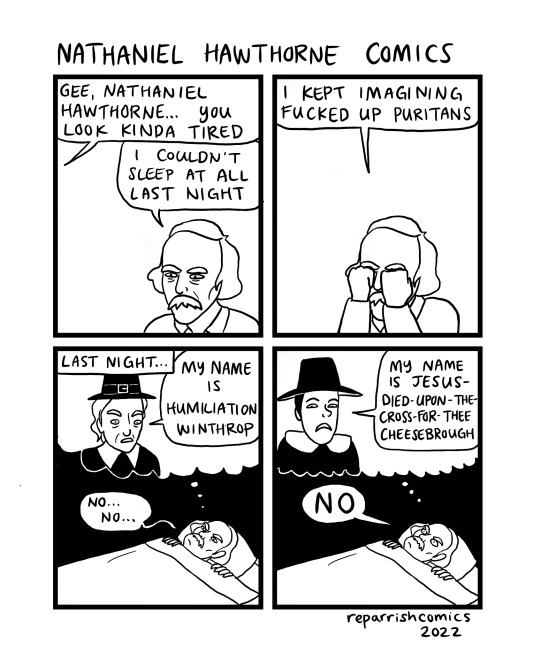
( Facebook / Twitter / Instagram / RedBubble / Buy Me A Coffee )
#nathaniel hawthorne#hawthorne#the scarlet letter#house of the seven gables#young goodman brown#puritans#american literature#literature#comic#comics
8K notes
·
View notes
Text
I'm honestly kind of amazed that this is a hot take or anything but if you genuinely believe that the Boyfriends Webtoon is "harmful fetishism of gay men," you have swallowed a transphobic smear campaign hook, line and sinker. Like, gee, I wonder why the runaway success webcomic that's a happy slice-of-life about a polyamorous gay relationship where one of the guys is trans is being held up as the Worst Thing That Exists since it was showcased in an ad campaign? Can't be because the author is a trans man. Why on Earth would people who hate trans men accuse one of "fetishizing gay men" by creating gay smut? Of course not, obviously they're allies, considering they cannot be bothered to gender Refrainbow correctly 90% of the time they talk about him. Obviously it's just harmless joshing around when most of the comments under a post talking about it are variations on "this comic makes me wanna commit so many hate crimes." It's just venting, y'all! It's not the right representation! And you know what happens when you find media that doesn't appeal specifically to you, right? You demonize the sexuality of a trans man from Indonesia! Because that's how you get more queer comics.
#boyfriends webtoon#y'all need to think before jumping on your disgust reflex and riding it around town#and it really skeeves me out to see that it's just accepted fact in most places - WITH QUEER PEOPLE - that this is 'fujoshi shit'#y'all need to do better#transandrophobia#puritans
4K notes
·
View notes
Text
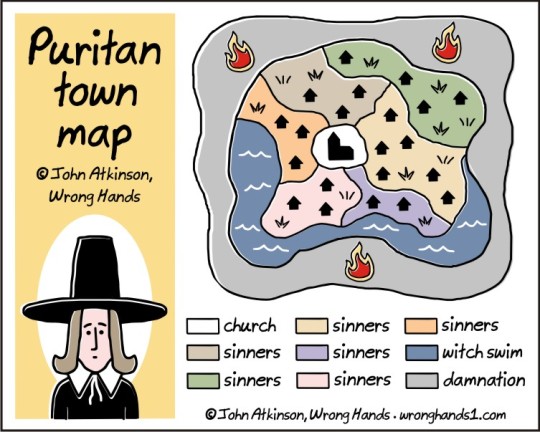
#wronghands#humor#history#puritans#church#religion#protestant#map#geography#john atkinson#lifestyle#witches
214 notes
·
View notes
Text
What God says is best, is best, though all the men in the world are against it.
John Bunyan
312 notes
·
View notes
Text
I don't know how to explain this to a lot of you but acting like any and all criticism is dangerous and the same book burning or governmental censorship is not owning the right-wingers, it's acting like one.
Being unable to accept criticism is not "fighting purity culture" or "owning the pruiteens." It's right-wing behavior. You are all just acting like the dudebros who think feminists are going to take their games away because they heard some anti-feminism claim it so. Or those who cry about cancel culture while their favorite celebrities get even more attention after their crimes have been brought to light.
And even if you have a point buried somewhere in your crying, acting like some "puritanical" children have the power to oppress you just shows how much of a whiny edge lord you are.
#left wing#right wing#purity culture#puritans#censorship#anti intellectualism#media critique#and all other kinds of critique
120 notes
·
View notes
Text
Why People Are Wrong About the Puritans of the English Civil War and New England
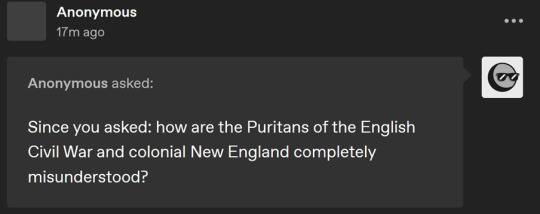



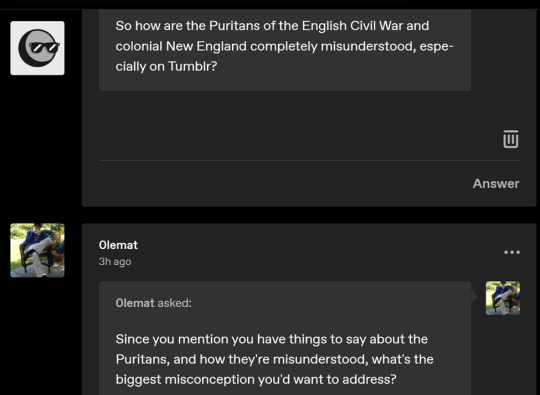
Oh well, if you all insist, I suppose I can write something.
(oh good, my subtle scheme is working...)
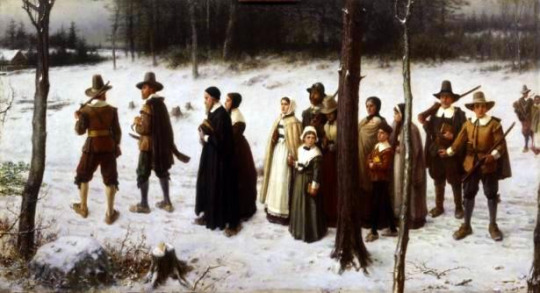
Introduction:
So the Puritans of the English Civil War is something I studied in graduate school and found endlessly fascinating in its rich cultural complexity, but it's also a subject that is popularly wildly misunderstood because it's caught in the jaws of a pair of distorted propagandistic images.
On the one hand, because the Puritans settled colonial New England, since the late 19th century they've been wrapped up with this nationalist narrative of American exceptionalism (that provides a handy excuse for schoolteachers to avoid talking about colonial Virginia and the centrality of slavery to the origins of the United States). If you went to public school in the United States, you're familiar with the old story: the United States was founded by a people fleeing religious persecution and seeking their freedom, who founded a society based on social contracts and the idea that in the New World they were building a city on a hill blah blah America is an exceptional and perfect country that's meant to be an example to the world, and in more conservative areas the whole idea that America was founded as an explicitly Christian country and society.
Then on the other hand, you have (and this is the kind of thing that you see a lot of on Tumblr) what I call the Matt Damon-in-Good-Will-Hunting, "I just read Zinn's People's History of the United States in U.S History 101 and I'm home for my first Thanksgiving since I left for colleg and I'm going to share My Opinions with Uncle Burt" approach. In this version, everything in the above nationalist narrative is revealed as a hideous lie: the Puritans are the source of everything wrong with American society, a bunch of evangelical fanatics who came to New England because they wanted to build a theocracy where they could oppress all other religions and they're the reason that abortion-banning, homophobic and transphobic evangelical Christians are running the country, they were all dour killjoys who were all hopelessly sexually repressed freaks who hated women, and the Salem Witch Trials were a thing, right?
And if anyone spares a thought to examine the role that Puritans played in the English Civil War, it basically short-hands to Oliver Cromwell is history's greatest monster, and didn't they ban Christmas?
Here's the thing, though: as I hope I've gotten across in my posts about Jan Hus, John Knox, and John Calvin, the era of the Reformation and the Wars of Religion that convulsed the Early Modern period were a time of very big personalities who were complicated and not very easy for modern audiences to understand, because of the somewhat oblique way that Early Modern people interpreted and really believed in the cultural politics of religious symbolism.
So what I want to do with this post is to bust a few myths and tease out some of the complications behind the actual history of the Puritans.
Did the Puritans Experience Religious Persecution?
Yes, but that wasn't the reason they came to New England, or at the very least the two periods were divided by some decades. To start at the beginning, Puritans were pretty much just straightforward Calvinists who wanted the Church of England to be a Calvinist Church. This was a fairly mainstream position within the Anglican Church, but the "hotter sort of Protestant" who started to organize into active groups during the reigns of Elizabeth and James I were particularly sensitive to religious symbolism they (like the Hussites) felt smacked of Catholicism and especially the idea of a hierarchy where clergy were a better class of person than the laity.
So for example, Puritans really first start to emerge during the Vestments Controversy in the reign of Edward VI where Bishop Hooper got very mad that Anglican priests were wearing the cope and surplice, which he thought were Catholic ritual garments that sought to enhance priestly status and that went against the simplicity of the early Christian Church. Likewise, during the run-up to the English Civil War, the Puritans were extremely sensitive to the installation of altar rails which separated the congregation from the altar - they considered this to be once again a veneration of the clergy, but also a symbolic affirmation of the Catholic doctrine of transubstantiation.
At the same time, they were not the only religious faction within the Anglican Church - and this is where the religious persecution thing kicks in, although it should be noted that this was a fairly brief but very emotionally intense period. Archbishop William Laud was a leading High Church Episcopalian who led a faction in the Church that would become known as Laudians, and he was just as intense about his religious views as the Puritans were about his. A favorite of Charles I and a first advocate of absolutist monarchy, Laud was appointed Archbishop of Canturbury in 1630 and acted quickly to impose religious uniformity of Laudian beliefs and practices - ultimately culminating in the disastrous decision to try imposing Episcopalianism on Scotland that set off the Bishop's Wars.
The Puritans were a special target of Laud's wrath: in addition to ordering the clergy to do various things offensive to Puritans that he used as a shibboleth to root out clergy with Puritan sympathies and fire them from their positions in the Church, he established official religious censors who went after Puritan writers like William Prynne for seditious libel and tortured them for their criticisms of his actions, cropping their ears and branding them with the letters SL on their faces. Bringing together the powers of Church and State, Laud used the Court of Star Chamber (a royal criminal court with no system of due process) to go after anyone who he viewed as having Puritan sympathies, imposing sentences of judicial torture along the way.
It was here that the Puritans began to make their first connections to the growing democratic movement in England that was forming in opposition to Charles I, when John Liliburne the founder of the Levellers was targeted by Laud for importing religious texts that criticized Laudianism - Laud had him repeatedly flogged for challenging the constitutionality of the Star Chamber court, and "freeborn John" became a martyr-hero to the Puritans.
When the Long Parliament met in 1640, Puritans were elected in huge numbers, motivated as they were by a combination of resistance to the absolutist monarchism of Charles I and the religious policies of Archbishop Laud - who Parliament was able to impeach and imprison in the Tower of the London in 1641.
This relatively brief period of official persecution that powerfully shaped the Puritan mindset was nevertheless disconnected from the phenomena of migration to New England - which had started a decade before Laud became Archbishop of Canterbury and continued decades after his impeachment.
The Puritans Just Wanted to Oppress Everyone Else's Religion:
This is the very short-hand Howard Zinn-esque critique we often see of the Puritan project in the discourse, and while there is a grain of truth to it - in the Massachusetts Bay Colony, the Congregational Church was the official state religion, no other church could be established without permission from the Congregational Church, all residents were required to pay taxes to support the Congregational Church, and only Puritans could vote. Moreover, there were several infamous incidents where the Puritan establishment put Anne Hutchinson on trial and banished her, expelled Roger Williams, and hanged Quakers.
Here's the thing, though: during the Early Modern period, every single side of every single religious conflict wanted to establish religious uniformity and oppress the heretics: the Catholics did it to the Protestants where they could mobilize the power of the Holy Roman Emperor against the Protestant Princes, the Protestants did it right back to the Catholics when Gustavus Adolphus' armies rolled through town, the Lutherans and the Catholics did it to the Calvinists, and everybody did it to the Anabaptists.
That New England was founded as a Calvinist colony is pretty unremarkable, in the final analysis. (By the by, both Hutchinson and Williams were devout if schismatic Puritans who were firmly of the belief that the Anglican Church was a false church.) What's more interesting is how quickly the whole religious project broke down and evolved into something completely different.
Essentially, New England became a bunch of little religious communes that were all tax-funded, which is even more the case because the Congregationalist Church was a "gathered church" where the full members of the Church (who were the only people allowed to vote on matters involving the church, and were the only ones who were allowed to be given baptism and Communion, which had all kinds of knock-on effects on important social practices like marriages and burials) and were made up of people who had experienced a conversion where they can gained an assurance of salvation that they were definitely of the Elect. You became a full member by publicly sharing your story of conversion (which had a certain cultural schema of steps that were supposed to be followed) and having the other full members accept it as genuine.
This is a system that works really well to bind together a bunch of people living in a commune in the wilderness into a tight-knit community, but it broke down almost immediately in the next generation, leading to a crisis called the Half-Way Covenant.
The problem was that the second generation of Puritans - all men and women who had been baptized and raised in the Congrgeationalist Church - weren't becoming converted. Either they never had the religious awakening that their parents had had, or their narratives weren't accepted as genuine by the first generation of commune members. This meant that they couldn't hold church office or vote, and more crucially it meant that they couldn't receive the sacrament or have their own children baptized.
This seemed to suggest that, within a generation, the Congregationalist Church would essentially define itself into non-existence and between the 1640s and 1650s leading ministers recommended that each congregation (which was supposed to decide on policy questions on a local basis, remember) adopt a policy whereby the children of baptized but unconverted members could be baptized as long as they did a ceremony where they affirmed the church covenant. This proved hugely controversial and ministers and laypeople alike started publishing pamphlets, and voting in opposing directions, and un-electing ministers who decided in the wrong direction, and ultimately it kind of broke the authority of the Congregationalist Church and led to its eventual dis-establishment.
The Puritans are the Reason America is So Evangelical:
This is another area where there's a grain of truth, but ultimately the real history is way more complicated.
Almost immediately from the founding of the colony, the Puritans begin to undergo mutation from their European counterparts - to begin with, while English Puritans were Calvinists and thus believed in a Presbyterian form of church government (indeed, a faction of Puritans during the English Civil War would attempt to impose a Presbyterian Church on England.), New England Puritans almost immediately adopted a congregationalist system where each town's faithful would sign a local religious constitution, elect their own ministers, and decide on local governance issues at town meetings.
Essentially, New England became a bunch of little religious communes that were all tax-funded, which is even more the case because the Congregationalist Church was a "gathered church" where the full members of the Church (who were the only people allowed to vote on matters involving the church, and were the only ones who were allowed to be given baptism and Communion, which had all kinds of knock-on effects on important social practices like marriages and burials) and were made up of people who had experienced a conversion where they can gained an assurance of salvation that they were definitely of the Elect. You became a full member by publicly sharing your story of conversion (which had a certain cultural schema of steps that were supposed to be followed) and having the other full members accept it as genuine.
This is a system that works really well to bind together a bunch of people living in a commune in the wilderness into a tight-knit community, but it broke down almost immediately in the next generation, leading to a crisis called the Half-Way Covenant.
The problem was that the second generation of Puritans - all men and women who had been baptized and raised in the Congrgeationalist Church - weren't becoming converted. Either they never had the religious awakening that their parents had had, or their narratives weren't accepted as genuine by the first generation of commune members. This meant that they couldn't hold church office or vote, and more crucially it meant that they couldn't receive the sacrament or have their own children baptized.
This seemed to suggest that, within a generation, the Congregationalist Church would essentially define itself into non-existence and between the 1640s and 1650s leading ministers recommended that each congregation (which was supposed to decide on policy questions on a local basis, remember) adopt a policy whereby the children of baptized but unconverted members could be baptized as long as they did a ceremony where they affirmed the church covenant. This proved hugely controversial and ministers and laypeople alike started publishing pamphlets, and voting in opposing directions, and un-electing ministers who decided in the wrong direction, and accusing one another of being witches. (More on that in a bit.)
And then the Great Awakening - which to be fair, was a major evangelical effort by the Puritan Congregationalist Church, so it's not like there's no link between evangelical - which was supposed to promote Congregational piety ended up dividing the Church and pretty soon the Congregationalist Church is dis-established and it's safe to be a Quaker or even a Catholic on the streets of Boston.
But here's the thing - if we look at which denominations in the United States can draw a direct line from themselves to the Congregationalist Church of the Puritans, it's the modern Congregationalists who are entirely mainstream Protestants whose churches are pretty solidly liberal in their politics, the United Church of Christ which is extremely cultural liberal, and it's the Unitarian Universalists who are practically issued DSA memberships. (I say this with love as a fellow comrade.)
By contrast, modern evangelical Christianity (although there's a complicated distinction between evangelical and fundamentalist that I don't have time to get into) in the United States is made up of an entirely different set of denominations - here, we're talking Baptists, Pentacostalists, Methodists, non-denominational churches, and sometimes Presbyterians.
The Puritans Were Dour Killjoys Who Hated Sex:
This one owes a lot to Nathaniel Hawthorne's Scarlet Letter.
The reality is actually the opposite - for their time, the Puritans were a bunch of weird hippies. At a time when most major religious institutions tended to emphasize the sinful nature of sex and Catholicism in particular tended to emphasize the moral superiority of virginity, the Puritans stressed that sexual pleasure was a gift from God, that married couples had an obligation to not just have children but to get each other off, and both men and women could be taken to court and fined for failing to fulfill their maritial obligations.
The Puritans also didn't have much of a problem with pre-marital sex. As long as there was an absolute agreement that you were going to get married if and when someone ended up pregnant, Puritan elders were perfectly happy to let young people be young people. Indeed, despite the objection of Jonathan Edwards and others there was an (oddly similar to modern Scandinavian customs) old New England custom of "bundling," whereby a young couple would be put into bed together by their parents with a sack or bundle tied between them as a putative modesty shield, but where everyone involved knew that the young couple would remove the bundle as soon as the lights were turned out.
One of my favorite little social circumlocutions is that there was a custom of pretending that a child clearly born out of wedlock was actually just born prematurely to a bride who was clearly nine months along, leading to a rash of surprisingly large and healthy premature births being recorded in the diary of Puritan midwife Martha Ballard. Historians have even applied statistical modeling to show that about 30-40% of births in colonial America were pre-mature.
But what about non-sexual dourness? Well, here we have to understand that, while they were concerned about public morality, the Puritans were simultaneously very strict when it came to matters of religion and otherwise normal people who liked having fun. So if you go down the long list of things that Puritans banned that has landed them with a reputation as a bunch of killjoys, they usually hide some sort of religious motivation.
So for example, let's take the Puritan iconoclastic tendency to smash stained glass windows, whitewash church walls, and smash church organs during the English Civil War - all of these things have to do with a rejection of Catholicism, and in the case of church organs a belief that the only kind of music that should be allowed in church is the congregation singing psalms as an expression of social equality. At the same time, Puritans enjoyed art in a secular context and often had portraits of themselves made and paintings hung on their walls, and they owned musical instruments in their homes.
What about the wearing nothing but black clothing? See, in our time wearing nothing but black is considered rather staid (or Goth), but in the Early Modern period the dyes that were needed to produce pure black cloth were incredibly expensive - so wearing all black was a sign of status and wealth, hence why the Hapsburgs started emphasizing wearing all-black in the same period. However, your ordinary Puritan couldn't afford an all-black attire and would have worn quite colorful (but much cheaper) browns and blues and greens.
What about booze and gambling and sports and the theater and other sinful pursuits? Well, the Puritans were mostly ok with booze - every New England village had its tavern - but they did regulate how much they could serve, again because they were worried that drunkenness would lead to blasphemy. Likewise, the Puritans were mostly ok with gambling, and they didn't mind people playing sports - except that they went absolutely beserk about drinking, gambling, and sports if they happened on the Sabbath because the Puritans really cared about the Sabbath and Charles I had a habit of poking them about that issue. They were against the theater because of its association with prostitution and cross-dressing, though, I can't deny that. On the other hand, the Puritans were also morally opposed to bloodsports like bear-baiting, cock-fighting, and bare-knuckle boxing because of the violence it did to God's creatures, which I guess makes them some of the first animal rights activsts?
They Banned Christmas:
Again, this comes down to a religious thing, not a hatred of presents and trees - keep in mind that the whole presents-and-trees paradigm of Christmas didn't really exist until the 19th century and Dickens' Christmas Carol, so what we're really talking about here is a conflict over religious holidays - so what people were complaining about was not going to church an extra day in the year. I don't get it, personally.
See, the thing is that Puritans were known for being extremely close Bible readers, and one of the things that you discover almost immediately if you even cursorily read the New Testament is that Christ was clearly not born on December 25th. Which meant that the whole December 25th thing was a false religious holiday, which is why they banned it.
The Puritans Were Democrats:
One thing that I don't think Puritans get enough credit for is that, at a time when pretty much the whole of European society was some form of monarchist, the Puritans were some of the few people out there who really committed themselves to democratic principles.
As I've already said, this process starts when John Liliburne, an activist and pamphleteer who promoted the concept of universal human rights (what he called "freeborn rights"), took up the anti-Laudian cause and it continued through the mobilization of large numbers of Puritans to campaign for election to the Long Parliament.
There, not only did the Puritans vote to revenge themselves on their old enemy William Laud, but they also took part in a gradual process of Parliamentary radicalization, starting with the impeachment of Strafford as the architect of arbitrary rule, the passage of the Triennal Acts, the re-statement that non-Parliamentary taxation was illegal, the Grand Remonstrance, and the Militia Ordinance.
Then over the course of the war, Puritans served with distinction in the Parliamentary army, especially and disproportionately in the New Model Army where they beat the living hell out of the aristocratic armies of Charles I, while defying both the expectations and active interference of the House of Lords.
At this point, I should mention that during this period the Puritans divided into two main factions - Presbyterians, who developed a close political and religious alliance with the Scottish Covenanters who had secured the Presbyterian Church in Scotland during the Bishops' Wars and who were quite interested in extending an established Presbyterian Church; and Independents, who advocated local congregationalism (sound familiar) and opposed the concept of established churches.
Finally, we have the coming together of the Independents of the New Model Army and the Leveller movement - during the war, John Liliburne had served with bravery and distinction at Edgehill and Marston Moore, and personally capturing Tickhill Castle without firing a shot. His fellow Leveller Thomas Rainsborough proved a decisive cavalry commander at Naseby, Leicester, the Western Campaign, and Langport, a gifted siege commander at Bridgwater, Bristol, Berkeley Castle, Oxford, and Worcester.
Thus, when it came time to hold the Putney Debates, the Independent/Leveller bloc had both credibility within the New Model Army and the only political program out there. Their proposal:
redistricting of Parliament on the basis of equal population; i.e one man, one vote.
the election of a Parliament every two years.
freedom of conscience.
equality under the law.
In the context of the 17th century, this was dangerously radical stuff and it prompted Cromwell and Fairfax into paroxyms of fear that the propertied were in danger of being swamped by democratic enthusiasm - leading to the imprisonment of Lilburne and the other Leveller leaders and ultimately the violent suppression of the Leveller rank-and-file.
As for Cromwell, well - even the Quakers produced Richard Nixon.
#history#puritans#calvinism#english civil war#oliver cromwell#the stupid meme about christmas#new england#protestantism
422 notes
·
View notes
Text
@sonnabug reblogged your post:
#is myth the right word if they were the ones who felt they were being persecuted? #not siding with them just wondering about word choice and technicalities #because its true our history was founded on what they decided to tell us but is it an outright lie or did they truely feel persecuted
Oo oo oo, a teaching opportunity!
Okay, so the Puritans came to power during the First English Civil War - the one where they axed Charles I afterward and abolished the monarchy. Their whole beef was that the new Anglican church wasn't STRICT enough and still had too many Catholic trappings (and way too much tolerance for the remaining Roman Catholics in the country). So they kept pushing for Purity and Piety, in personal and business spheres, basically insisting that a strict Protestant moral doctrine should govern every aspect of life, from the management of the home to the running of businesses to interpersonal relationships to the governing of the country and its' policies abroad.
Sound familiar? Their whole rhetoric puts me in mind of a particular line from Elvira: Mistress of the Dark: "The local council is horrified if someone in Fallwell, wherever or whatever, is having a good time."
Anyway, all this religious kerfluffle (plus a couple of other factors) eventually led to the complete destabilization of the English government and the execution of Charles I. And then when the monarchy was restored under Charles II and the country was like, "Oh thank goodness, we can have things like beer and Christmas again and maybe a little less religious conservatism," the Puritans promptly went, "Well this won't do at ALL." Most Puritan clergy with separatist leanings resigned from the Church of England and many Puritans packed up to move to the colonies, where they could "practice their religion in peace." (Read: "Where they could be as stodgy and strict and bigoted as they wished and created a system of laws based on religion instead of common good.")
There's a lot more to it than that and I'm simplifying and glossing over quite a bit, but that's the nuts and bolts.
The mess the Puritans made both in England and in America was one of the reasons the vaunted Founding Fathers insisted on Separation of Church and State, as well as why Freedom of Religion is part of the First Amendment. They'd seen England tearing itself apart over a Wabbit Season / Duck Season tug of war between Catholicism and Protestantism for a good century and more, and they did NOT want to repeat those mistakes in the new country they were trying to build. (They got a lot of stuff wrong, but at least they had the sense to be like, "Yeah maybe religion shouldn't run the government.")
So while it's true that the Puritans may have felt persecuted, it was for basically the same reasons that conservatives and fundamentalists claims to be oppressed today - people generally don't like it when their stodgy uptight neighbors try to beat them over the head with a Bible and demand that one particular interpretation of a single religion should be the driving force behind the running of every aspect of an entire country.
But since they got to write the earliest chapters of American history with no one to provide a strong counterargument, we get this pervasive self-created myth that the Puritans were these poor ragged refugees, fleeing religious persecution for a new land where they could live in peace and harmony and...decimate the local indigenous population and murder their own neighbors in the name of piety. The Pilgrims were assholes and we've been fed pretty lies in our schoolbooks for decades.
(For modern context, religion wasn't a strong part of American politics until McCarthyism happened, at which point we got the God references in the Pledge of Allegiance and on our currency. Then the Moral Majority movement got Reagan elected in 1980 and we've been fighting modern Puritans in government ever since. America has never been a Christian nation, but conservatives keep doing their damnedest to try and turn it into one.)
Hope this helps to clarify things! 😊
536 notes
·
View notes
Text
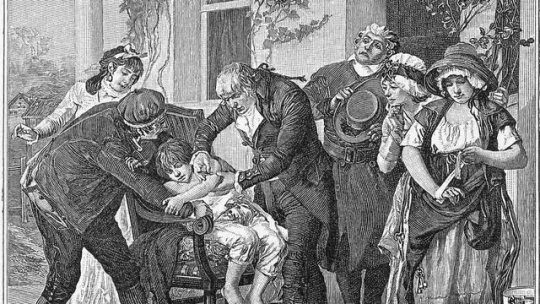
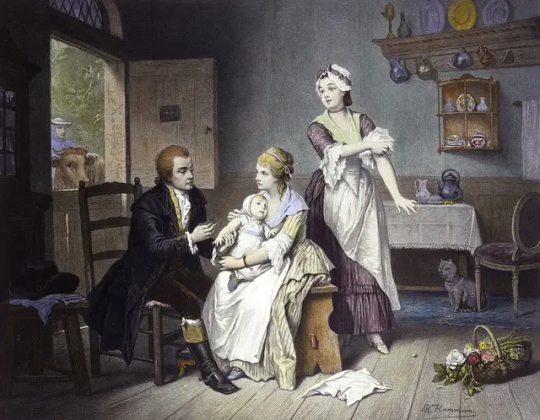

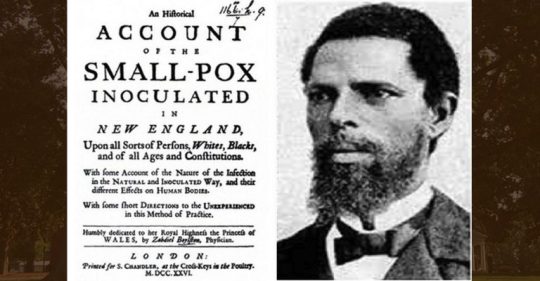
Onesimus (late 1600s–1700s) was an African man who was instrumental in the mitigation of the impact of a smallpox outbreak in Boston, Massachusetts. His birth name is unknown. He was enslaved and, in 1706, was given to the New England Puritan minister Cotton Mather, who renamed him. Onesimus introduced Mather to the principle and procedure of the variolation method of inoculation to prevent the disease, which laid the foundation for the development of vaccines. After a smallpox outbreak began in Boston in 1721, Mather used this knowledge to advocate for inoculation in the population. This practice eventually spread to other colonies. In a 2016 Boston magazine survey, Onesimus was declared one of the "Best Bostonians of All Time"

Onesimus's name at birth and place of birth are unknown with certainty. He was first documented as living in the colonies in 1706, having been brought to North America as an enslaved person. In December of that year, he was given as a gift by a church congregation to Cotton Mather, their Puritan minister of North Church, as well as a prominent figure in the Salem Witch Trials. Mather renamed him after a first-century AD enslaved person mentioned in the Bible.The name, "Onesimus" means "useful, helpful, or profitable".
Mather referred to the ethnicity of Onesimus as "Guaramantee", which may refer to the Coromantee (also known as Akan people of modern Ghana).
Mather saw Onesimus as highly intelligent and educated him in reading and writing with the Mather family (for context, according to biographer Kathryn Koo, at that time, literacy was primarily associated with religious instruction, and writing as means of note-taking and conducting business)

In 1716 or shortly before, Onesimus had described to Mather the process of inoculation that had been performed on him and others in his society in Africa (as Mather reported in a letter): "People take Juice of Small-Pox; and Cut the Skin, and put in a drop." In the book, African Medical Knowledge, the Plain Style, and Satire in the 1721 Boston Inoculation Controversy, Kelly Wisecup wrote that Onesimus is believed to have been inoculated at some point before being sold into slavery or during the slave trade, as he most likely traveled from the West Indies to Boston.

The variolation method of inoculation was long practiced in Africa among African people.
The practice was widespread among enslaved colonial people from many regions of Africa and, throughout the slave trade in the Americas, slave communities continued the practice of inoculation despite regional origin.
Mather followed Onesimus's medicinal advice because, as Margot Minardi writes, "inferiority had not yet been indelibly written onto the bodies of Africans."

#african#afrakan#kemetic dreams#africans#brownskin#brown skin#afrakans#african culture#afrakan spirituality#smallpox#vodun#obeah#margot minardi#ghana#akan#Salem Witch Trials#smallpox outbreak in Boston#Massachusetts.#Coromantee#puritans
94 notes
·
View notes
Text


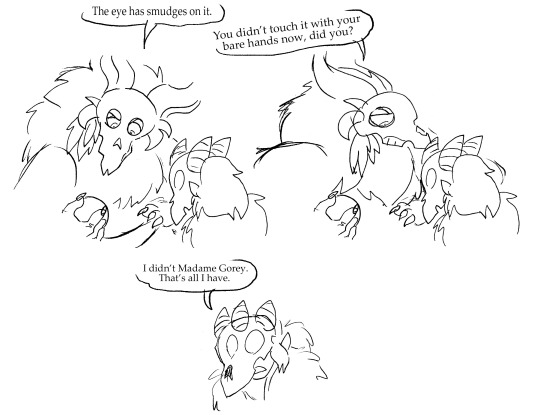
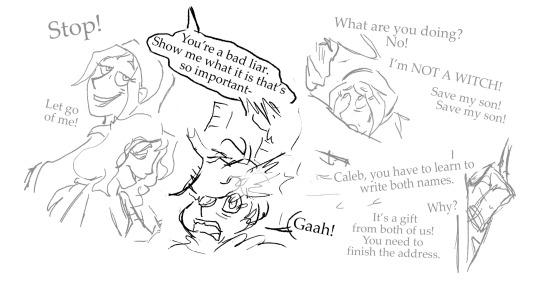

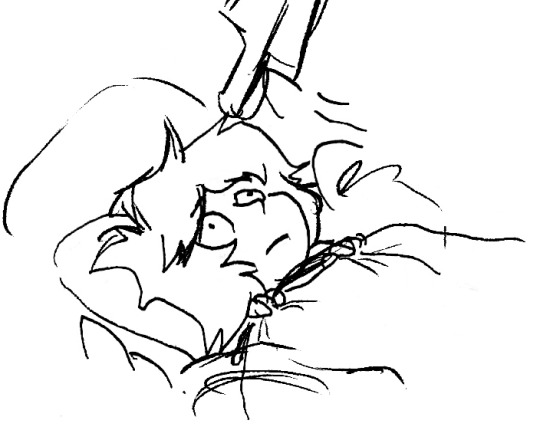
Eve and the Witnits - Eye on You
>tmw I accidentally saw my mom's graphic death and realized everyone hated me while I was still 9. Good times.
Mad Gorey could see his thoughts because she was keen to oracle magic.
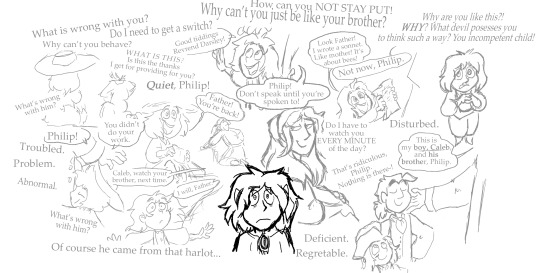
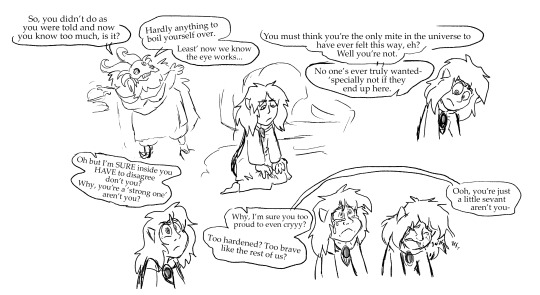




#my art#franki lew#artists on tumblr#puritans#witch trials#salem witch trials#the owl house#the owl house au#toh au#toh comic#toh aus#philip wittebane#wittebane brothers#wittebros#emperor belos#titan trappers#cw: abuse
54 notes
·
View notes
Text
It amazes me how ace people have gotten the reputation of being these sex negative hive mind dorks meanwhile allo people are the most puritanical people on Earth. Fr.
#amatonormativity#aroace#demisexual#demiaroace#acespec#asexual#asexuality#purity culture#puritans#allos are weird
50 notes
·
View notes
Text
Saw someone bitching about how "puriteen" is "embarassing" because it's "rude and condescending..." and--it's supposed to be rude and condescending, for heavens' sake. I try not to use it for that very reason, but I understand that people are using it to express their frustration with children who refuse to take the opportunity to learn how kink or fiction or literally anything works and the many, many profoundly immature (and breathtakingly irresponsible) adults who encourage them. It's not supposed to be nice, it's supposed to make a point; it's an admittedly harsh reminder to grow up and get off the internet before someone gets hurt (and stop invalidating CSA survivors while you're at it).
#saw someone else whining about “fictional CP” which doesn't actually exist#either something is cp OR it's fictional#csa survivors are not fictional characters and vice versa#puritans#neopuritans#proshipping#anti censorship#puriteens
79 notes
·
View notes
Text
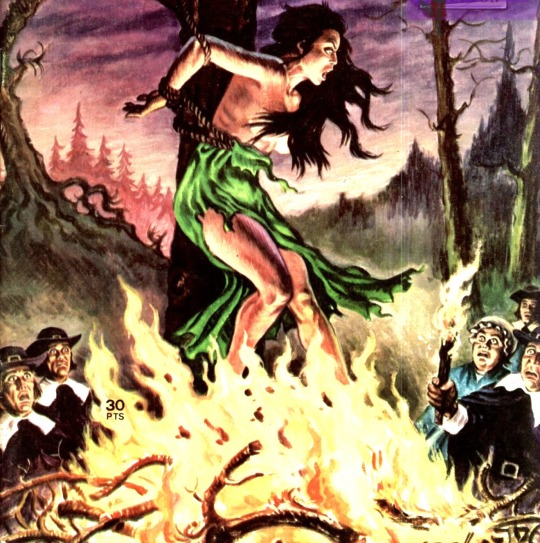
127 notes
·
View notes
Text
When the Holy Spirit sanctifies believers, he does a complete work in them. He puts into their minds, wills and hearts a gracious, supernatural principle which fills them with a holy desire to live to God. The whole life and being of holiness lies in this. This is the new creation
John Owen
245 notes
·
View notes
Text
I miss the days when someone misusing Puritan and purity culture was a big red flag that the person was in fact dog-whistling.
It's so normal now that almost everyone misuses it. Which makes it hard to tell who is dog-whistling and who isn't.
29 notes
·
View notes
Text
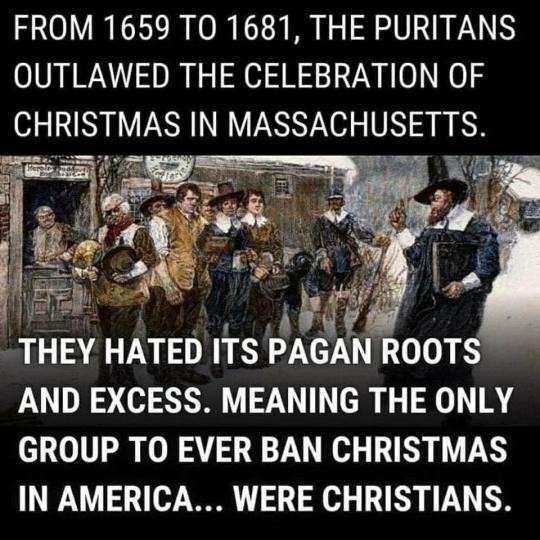
31 notes
·
View notes